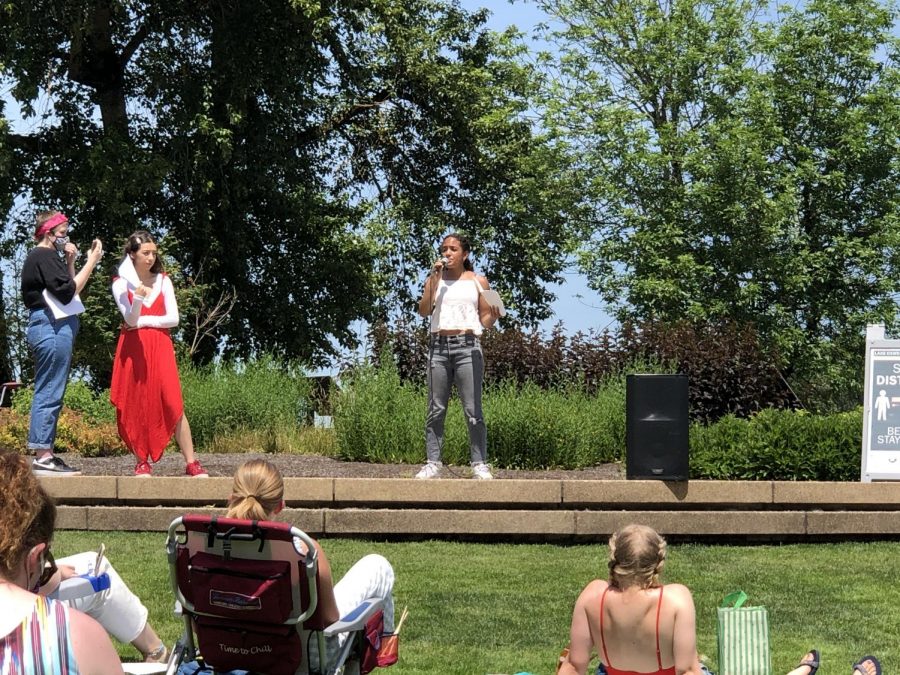Lakeridge High School students hold discussion on racism
June 19, 2020
The Lakeridge High School Equity Council held a “Juneteenth Open Session” at Foothills Park to discuss racism in Lake Oswego.
To start the event, the Equity Council and students of color from both LOSD high schools gave speeches about their experiences with racism in Lake Oswego and called upon the audience to continue the momentum created by the marches across the country over the past few weeks and fight against racism daily. Next, the crowd broke into smaller groups to discuss the questions on a given handout. Finally, the larger group was called back together to share back the ideas shared in smaller groups and hear closing remarks.
Upon entering the event, participants were given a different sheet of paper depending on whether they were a student or adult. Both papers contained directions, guidelines and discussion questions for later in the session. On the back, the paper had “actions items” to complete and a pledge to be “actively anti-racist in my daily life and activism.” The pledge continues, “I will acknowledge that I will make mistakes, and I see my own biases as a lifelong challenge to face and address. I will participate in this conversation for the long-run, and actively seek opportunities to advance the Black Rights movement.”
The event organizers started their opening speeches with ground rules for discussions and the history of Juneteenth and racism in Lake Oswego. “We all have an obligation to confront racism…. You have this opportunity today and every day to change your worldview,” said LHS class of 2020 alum Mya Gordon. The presenters highlighted the lack of interest in conversations around equity and inclusion, noting the hundreds of students absent during “This Is Us” day, an event at both LOSD high schools where students attended diversity-focused workshops and lectures during the school day. “Do not let this trend of apathy continue,” said Anna-Marie Gunther, a recent alum of the LHS class of 2020.
Then, the speakers laid out two demands. They first asked to defund the police, noting their disproportionate use of violence against Black people. “Regulations are important… but insufficient” for creating lasting change, said Gunther. Next, they asked for investment in Black communities and addressed the lasting effects of slavery, Jim Crow laws and other systemic discriminatory actions that have prohibited people of color and Black people from building wealth.
Afterwards, students of color from both LOSD high schools spoke about their experiences with racism. Some described being on the receiving of frequent microaggressions and being told they were too sensitive about their experience.
“There were lots of explicitly racist things that happened to me… a lot of them were microaggressions,” said Gemma Pleas, a LOHS class of 2020 alum. She added that because many in Lake Oswego had never talked to a Black person, she felt “like the ambassador for my own race… that weighed on me a lot [as a child.]”
Many of the speakers had moved from other parts of the country, joining LOSD in middle school. An Arab LHS student described her experience moving from Birmingham, Alabama to Lake Oswego.
“[Lake Oswego] was more racist…. I would receive videos from boys with towels around their heads [mimicking religious head coverings,] carrying Nerf guns, and saying ‘Allahu Akbar.’” She recounted being told that she was too sensitive after expressing hurt over being called a terrorist. “There were a lot of bomb jokes,” she said.
Gordon spoke about the culture shock of moving from diverse New Jersey to majority white Lake Oswego. For a long time, Gordon felt that Lake Oswego was not her home, and she was frequently told she was being “too sensitive” about her experience. She also expressed her fear that “in a couple weeks this momentum will die out” and the conversations about racial injustice will end.
Other speakers had similar calls to continue the momentum of the past few weeks of rallies against racial injustice. “You gotta show up tomorrow and the next day,” said Sonoma Leland, an LHS senior. Noting the town’s love of sports, she said, “The same love you bring to sporting events, I want you to bring it here.”
After speaking, the presenters urged participants to break up into smaller groups of about five to 10 people for discussing questions on the paper given. Gunther stressed that “being honest was more important than being right,” and that “if you are not uncomfortable, then you are not participating.”
The questions asked students to confront past mistakes such as “virtue signaling,” a term defined as “doing good just so others will see you doing it,” as well as participating in or being a bystander to racially-charged incidents. They also asked students to examine internal biases and privileges. Other questions focused on the LOSD educational experience specifically, such as analyzing whether district administrators “used disciplinary action in racially-charged incidents” effectively, and “What does it mean to be taught an inclusive and equitable academic curriculum?”
LOSD superintendent Dr. Lora de la Cruz also attended the event. She feels that “we should post more opportunities like this for our staff… I’m seeing more desire and requests [among the staff] to have these conversations.” She also expressed admiration for the people leading the event and felt “heartened to see this opportunity for small groups to come together and discuss.”
To the people who did not attend the open session, Gordon asks them to join their local equity group and continue working and having these conversations. She also created a documentary on racism in Lake Oswego called “Lake No Negro,” which can be viewed here.


